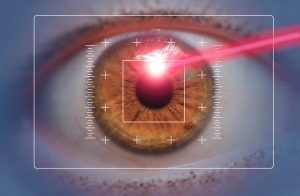
Did you know that LASIK Surgery is covered by FSA and HSA plans?
Every once in a while, patients ask us if they can use their Flexible Spending Accounts for LASIK vision correction surgery. In short, yes you can. Many patients contemplating LASIK surgery don’t realize that laser vision correction is an approved medical expense covered by both FSAs (Flexible Spending Accounts) and HSAs (Health Savings Accounts).
Actually, employer HSA and FSA programs are a popular way to pay for LASIK surgery setting aside funds taken from your paycheck before it’s subject to payroll taxes. By using FSA dollars to reduce your bill, you could save anywhere from 20-30% of the out-of-pocket cost of surgery, not to mention what you’ll save by decreasing your annual income tax liability.
If you are interested in using an FSA or HSA to pay for LASIK surgery, you should check with your employer to see if they provide an FSA or HSA program at your workplace. It’s also important that you understand how these programs work so that you can time your surgery to maximize your available funds.
What’s the key difference between an FSA and an HSA account?
While both FSA and HSA accounts both set aside pre-tax dollars from your paycheck to cover approved medical expenses, there are two key differences between these programs:
FSAs: annual contribution available from day 1, but use it or lose it
When you enroll in your employer’s FSA plan, you are typically asked how much you want to contribute to your Flexible Spending Account during a given year. This amount is then gradually deducted from your gross salary during each pay period before taxes are taken out. Starting in 2020, federal law puts a limit on how many pre-tax dollars you can contribute to your FSA at $2,750 per enrollment year.
It’s important to calculate how much money you plan to use on medical expenses during the year when determining how much you want to contribute to your FSA plan during your enrollment period. That’s because most FSA funds expire at the end of the plan year, meaning that if you haven’t used the funds you’ve set aside for medical expenses, you forfeit them because they cannot be rolled over into the next year.
Usually, the full amount of your annual FSA contribution is available for you to spend from the first day of your plan year, so you don’t have to wait until you’ve contributed the entire amount before being able to use your FSA funds for LASIK or other medical expenses. Of course, if you leave your company in the middle of the year, you’ll have to pay back spent funds that haven’t yet been covered by your payroll deductions.
Some FSA plans provide a short grace period after the enrollment year ends during which you can rollover any unused funds into the following year. Make sure to ask your plan administrator if your FSA has a grace period that allows you to roll over any unused funds. If not, you’re going to want to use every penny of your FSA money before your enrollment year ends.
HSAs: can only spend what you’ve contributed, but funds don’t expire
HSA accounts differ from FSAs in that they act more like a piggy bank for your healthcare spending. You can change how much you contribute to the account at any point during the year and any unused balances roll over into the next year.
HSAs are available only to people who have a high-deductible health plan, or HDHP, and who are not enrolled in Medicare. Some health insurance companies offer HSAs for their HDHPs.
If your employer doesn’t offer an HSA plan, you can open an HSA through some banks and other financial institutions and you can deduct all contributions from your taxable income when you file your taxes. According to IRS guidelines for 2020, contribution limits are capped at $3,550 for self-only coverage and $7,100 for family coverage in an HSA plan.
It’s important to know that you can spend only as many HSA dollars as you have sitting your HSA fund. So if you’re wondering can you use HSA for LASIK surgery, the answer is yes so long as you have accumulated enough HSA dollars to cover your surgery costs or you are prepared to pay the difference between the cost of surgery and what you have set aside in your HSA.
Tips for Using your HSA or FSA to pay for LASIK surgery
 Check with your HR department to determine the enrollment deadlines for your company’s HSA or FSA plan and to confirm that a LASIK procedure is included in your flexible spending account eligible expenses.
Check with your HR department to determine the enrollment deadlines for your company’s HSA or FSA plan and to confirm that a LASIK procedure is included in your flexible spending account eligible expenses.- Research your employer’s FSA plan to confirm whether you can use the full-pledged annual enrollment amount at any time during your plan year.
- Speak to your FSA/HSA plan administrator to learn what steps you need to take to submit your LASIK surgery expenses for reimbursement.
- Schedule a complimentary LASIK consultation at AGEI to determine that you are a good candidate for LASIK surgery before transferring any money into a medical savings account to help cover the cost of surgery. This is important because up to 20 percent of patients seeking refractive surgery don’t qualify for LASIK for medical reasons, so it’s important to confirm your eligibility before setting aside pre-tax dollars for this purpose.
- If you haven’t used your 2020 FSA dollars, remember that they are time-sensitive and we’re nearing the end of the year! Now is the time to book your appointment for a free consultation at AGEI and arrange for surgery before your 2020 benefits expire.
Don’t have an HSA or FSA plan? No worries!
Don’t have an HSA or FSA account? Or is vision correction surgery not reimbursed by your FSA plan? No to worry. According to the IRS, laser eye surgery (which includes LASIK and PRK) is considered a tax-deductible medical expense. Talk to your financial advisor to get more information on available tax deductions for your out-of-pocket expenditures for LASIK surgery and other eligible expenses.
You also might want to take advantage of financing options offered by AGEI to help our patients manage the cost of LASIK eye surgery, lens implant surgery, or other elective medical procedures. At Assil Gaur Eye Institute, we believe financial considerations should not be an obstacle to having better vision.
Why choose Assil Gaur Eye Institute for your eye care
The eye care professional team of ophthalmologists and optometrists at Assil Gaur Eye Institute (AGEI) offers world-class eye care treating dry eye conditions, cataracts, glaucoma, LASIK, and laser eye correction as well as a wide variety of cornea and retinal conditions.
At AGEI, you will experience a state-of-the-art health care facility that brings together revolutionary technologies with experienced vision care professionals. Our goal is to help you achieve your personal best vision.
Please call 866-945-2745 or visit us here to make an appointment online. If you are experiencing any concerning symptoms, contact us immediately to determine the best time to schedule an exam.
At Assil Gaur Eye Institute we take our patients’ safety seriously. Our facility’s Covid-19 patient safety procedures exceed all CDC recommendations. Masks are required in our institutes at all times.
We are conveniently located for patients throughout Southern California and the Los Angeles area at locations in or near Beverly Hills, Santa Monica, West Los Angeles, West Hollywood, Culver City, Hollywood, Venice, Marina del Rey, Malibu, Manhattan Beach, and Downtown Los Angeles, to name a few.
 Check with your HR department to determine the enrollment deadlines for your company’s HSA or FSA plan and to confirm that a LASIK procedure is included in your flexible spending account eligible expenses.
Check with your HR department to determine the enrollment deadlines for your company’s HSA or FSA plan and to confirm that a LASIK procedure is included in your flexible spending account eligible expenses.












